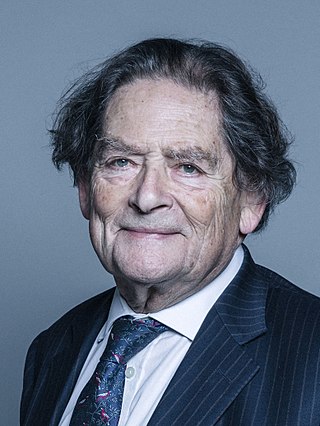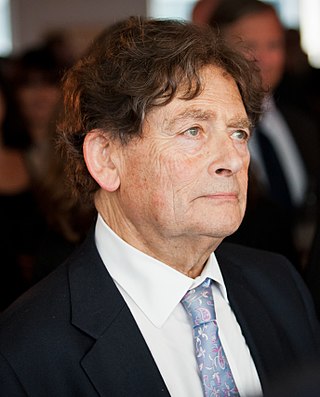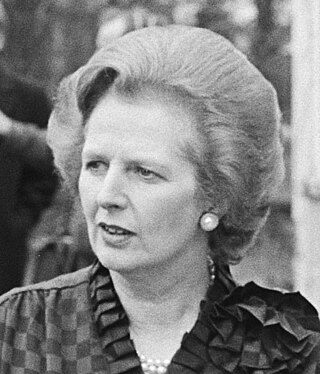
Reaganomics, or Reaganism, were the neoliberal economic policies promoted by U.S. President Ronald Reagan during the 1980s. These policies focused mainly on supply-side economics; however, opponents characterized them as "trickle-down economics" or "Voodoo Economics",, while Reagan and his advocates preferred to call it free-market economics.

Monetarism is a school of thought in monetary economics that emphasizes the role of policy-makers in controlling the amount of money in circulation. It gained prominence in the 1970s but was mostly abandoned as a direct guidance to monetary policy during the following decade because of the rise of inflation targeting through movements of the official interest rate.

Thatcherism is a form of British conservative ideology named after Conservative Party leader Margaret Thatcher that relates to not just her political platform and particular policies but also her personal character and style of management while in office. Proponents of Thatcherism are referred to as Thatcherites. The term has been used to describe the principles of the British government under Thatcher from the 1979 general election to her resignation in 1990. In international terms, Thatcherites have been described as a part of the general socio-economic movement known as neoliberalism, with different countries besides the United Kingdom sharing similar policies around expansionary capitalism.

Nigel Lawson, Baron Lawson of Blaby, was a British politician and journalist. A member of the Conservative Party, he served as Member of Parliament for Blaby from 1974 to 1992, and served in Margaret Thatcher's Cabinet from 1981 to 1989. Prior to entering the Cabinet, he served as the Financial Secretary to the Treasury from May 1979 until his promotion to Secretary of State for Energy. He was appointed Chancellor of the Exchequer in June 1983 and served until his resignation in October 1989. In both Cabinet posts, Lawson was a key proponent of Thatcher's policies of privatisation of several key industries.

Norman Stewart Hughson Lamont, Baron Lamont of Lerwick, is a British politician and former Conservative MP for Kingston-upon-Thames. He served as Chancellor of the Exchequer from 1990 until 1993. He was created a life peer in 1998. Lamont was a supporter of the Eurosceptic organisation Leave Means Leave.

Richard Edward Geoffrey Howe, Baron Howe of Aberavon,, known from 1970 to 1992 as Sir Geoffrey Howe, was a British politician who served as Deputy Prime Minister of the United Kingdom from 1989 to 1990. A member of the Conservative Party, he was Margaret Thatcher's longest-serving Cabinet minister, successively holding the posts of chancellor of the Exchequer, foreign secretary, and finally leader of the House of Commons, deputy prime minister and lord president of the Council. His resignation on 1 November 1990 is widely considered to have precipitated the leadership challenge that led to Thatcher's resignation three weeks later.

The Centre for Policy Studies (CPS) is a centre-right think tank and advocacy group in the United Kingdom. Its goal is to promote coherent and practical policies based on its founding principles of: free markets, "small state," low tax, national independence, self determination and responsibility. While being independent, the centre has historical links to the Conservative Party.
A tax cut typically represents a decrease in the amount of money taken from taxpayers to go towards government revenue. This decreases the revenue of the government and increases the disposable income of taxpayers. Tax rate cuts usually refer to reductions in the percentage of tax paid on income, goods and services. As they leave consumers with more disposable income, tax cuts are an example of an expansionary fiscal policy. Tax cuts also include reduction in tax in other ways, such as tax credit, deductions and loopholes.

Anthony Patrick Leslie Minford is a British macroeconomist who is professor of applied economics at Cardiff Business School, Cardiff University, a position he has held since 1997. He was Edward Gonner Professor of Applied Economics at the University of Liverpool from 1976 to 1997. In 2016, Minford was a notable member of the Economists for Brexit group which, in opposition to the consensus view of economists, advocated the UK leaving the European Union and claimed large economic benefits.

The early 1980s recession was a severe economic recession that affected much of the world between approximately the start of 1980 and 1982. Long-term effects of the early 1980s recession contributed to the Latin American debt crisis, long-lasting slowdowns in the Caribbean and Sub-Saharan African countries, the US savings and loan crisis, and a general adoption of neoliberal economic policies throughout the 1990s. It is widely considered to have been the most severe recession since World War II until the 2007–2008 financial crisis.

The Lawson Boom was the macroeconomic conditions prevailing in the United Kingdom at the end of the 1980s, which became associated with the policies of Margaret Thatcher's Chancellor of the Exchequer, Nigel Lawson.
Donald Norman Winch, was a British economist and academic. He was Professor of the History of Economics at the University of Sussex from 1969 to 2000, and its Pro-Vice-Chancellor from 1986 to 1989.

Masters of the Universe: Hayek, Friedman, and the Birth of Neoliberal Politics is a 2012 book by barrister Daniel Stedman Jones, in which the author traces the intellectual development and political rise of neoliberalism in the United States and the United Kingdom. Originally a PhD thesis, the author adapted it into a book.

The Gang of 25 or the Group of 25 was a cohort of British Conservative Party backbench members of Parliament (MPs) that threatened to vote against prime minister Margaret Thatcher's 1981 Autumn Statement. The statement contained monetarist measures to control inflation. Similar measures introduced since 1979 had reduced inflation but caused job losses in the manufacturing sector.
Michael John "Mike" Artis FBA was a British economist. A leading macroeconomist, his research encompassed monetary economics, fiscal policies, and European institutions and policies.

The 1972 United Kingdom budget was a budget delivered by Anthony Barber, the Chancellor of the Exchequer, on 21 March 1972. The budget is remembered for its large tax cuts, and led to high inflation and demands for higher wages, as well as the 1976 sterling crisis when the UK government was forced to ask the International Monetary Fund for financial help. It also led the Conservative Party to abandon "Post-war consensus" policies.

The 1988 United Kingdom budget was delivered by Nigel Lawson, the Chancellor of the Exchequer, to the House of Commons on 15 March 1988. It was the fifth budget to be delivered by Lawson during his tenure as Chancellor, and marked major changes to taxation, with reductions in income tax and changes to inheritance tax rules, as well as changes to mortgage interest relief that prevented homebuyers from being able to pool mortgage allowances. The changes announced to mortgage relief ultimately helped to further fuel an ongoing property boom which led to a rise in inflation and an increase in interest rates. Due to frequent disruptions during the Chancellor's speech, Deputy Speaker Harold Walker was required to suspend proceedings in what was described as an outbreak of "grave disorder".

The 1989 United Kingdom budget was delivered by Nigel Lawson, the Chancellor of the Exchequer, to the House of Commons on 14 March 1989. It was the sixth and final budget to be presented by Lawson during his tenure as Chancellor, and took a much more cautious approach to the UK economy than previous budgets delivered by Lawson. It was outlined against the back drop of mounting economic turbulence with increasing interest rates and rising inflation. 1989 was also the final pre-television era budget to be presented to the House of Commons.

The 1986 United Kingdom budget was delivered by Nigel Lawson, the Chancellor of the Exchequer, to the House of Commons on 18 March 1986. It was the third budget to be presented by Lawson, and saw the start of a programme of tax cuts initiated under the leadership of Conservative Prime Minister Margaret Thatcher. Lawson set the theme of his budget as "popular capitalism" and stated his wish to turn a nation of homeowners into a nation of shareholders. As well as a cut in the basic rate of income tax from 30% to 29%, there were other changes to taxation. 1986 was also the year the chancellor announced the launch of the Personal equity plan (PEP), a tax-exempt plan that would allow ordinary members of the public to invest up to £2,400 a year in equities. Labour leader Neil Kinnock, the leader of the Opposition, dismissed the budget as a "bits and pieces budget" that promised "jam tomorrow".

The 1982 United Kingdom budget was delivered by Geoffrey Howe, the Chancellor of the Exchequer, to the House of Commons on 9 March 1982. This was the fourth budget to be presented by Howe during his tenure as chancellor, and came at a time when unemployment had reached three million and the governing Conservative Party were unpopular in opinion polls. Howe painted a bleak picture of the UK economy and outlined a fairly neutral budget. As well as drawing criticism from the Leader of the Opposition, the statement was also condemned by the Conservative MP Ian Gilmour, who had advocated a reflation package worth £5bn. The budget was presented a few weeks before the Falklands War, an event that was to revive the Conservatives' fortunes.














